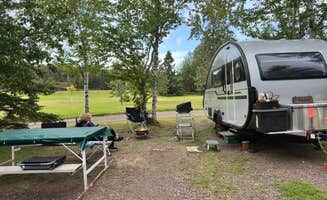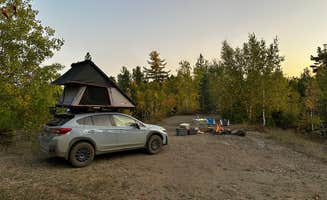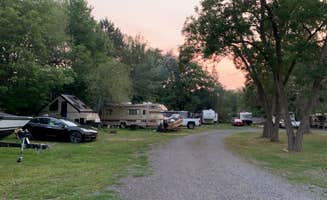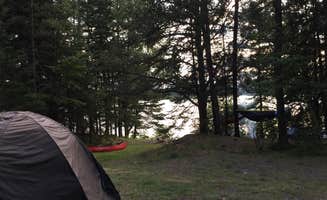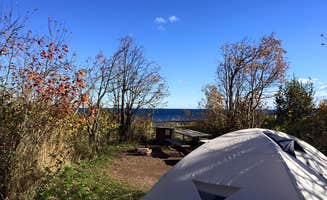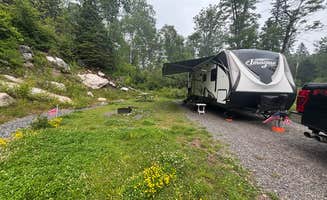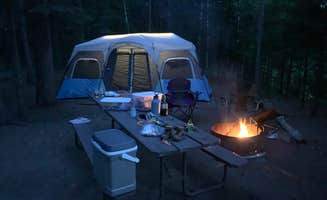Camping spots near Knife River, Minnesota include several state parks and dispersed options within 30 miles of this North Shore community. Winter camping options extend beyond the mentioned sites, with areas like Amnicon Falls State Park in Wisconsin remaining open year-round. The area features multiple waterways beyond Lake Superior, including smaller inland lakes and river systems that offer alternative fishing and paddling opportunities.
What to do
Waterfall exploration: Gooseberry Falls State Park Campground offers multiple cascades for wading and photography. "The hiking here is GREAT, a lot of cool trails and waterfalls to see. Along lake Superior there are a lot of cliffs to take in the view of the great lakes and a great spot for a picnic," notes a visitor. The park contains several falls connected by a network of hiking trails.
Mountain biking: Spirit Mountain Campground provides direct access to downhill trails from campsites. "We went up there to do the Heck of the North Gravel ride on a Saturday and then ride Spirit on Sunday. The best part was being able to bike down the trails right from the campground!" A camper recommends site 50 or 52 for better access to facilities.
Rock scrambling: Explore the sculpted granite formations along riverways at multiple parks. "I spent a day trip with friends at Jay Cook. The water levels were low, so we clambered around on the sculpted granite rocks that line the river and falls, dipping on and out of pools and up slick rock faces," explains one visitor about the unique geological features.
What campers like
Winter camping options: Jay Cooke State Park Campground maintains year-round access and offers unique winter experiences. The backpacking sites receive particular praise: "Very pretty and secluded! It was pretty buggy and ticks were bad, but that's to be expected. Bog/marsh was beautiful with some wildlife and was generally a very pleasant place to camp. Had a bear box as well which was great!"
Primitive camping privacy: Carrol Truck Trail provides a completely undeveloped camping experience. "Secluded! But nothing else. It's a fine place to go to get away from everything. There are 3 campsites at the end of the road where the GPS takes you. There are a few other pull offs along the way," explains one camper. Others note the access requires careful planning: "Easy to access, trails are all obvious, and near a water supply. We decided to go off the cuff, and the only thing we weren't ready for was the damn mosquitos!"
Lakeside camping with few amenities: Sites right on Lake Superior offer direct water access without established facilities. "This spot is pretty well hidden in the woods with a tight trail in. There are a few spots you could camp with stone firepits. Didn't look to be visited often, but I came in winter. There are low sites, and if you have 4x4, you can drive up to another plateau of sites."
What you should know
Reservations and timing: Book well in advance for lakefront sites, especially during summer months. "Reservations fill up quick a year in advance," explains a camper about Burlington Bay Campground. The best sites often book 6-12 months ahead, particularly those with lake views or electrical hookups.
Road noise: Highway proximity affects some campgrounds significantly. "Hwy 61 is only a few feet away & is VERY loud. There's no Jake brake ordinance for Two Harbors & the truckers are always doing it," notes a camper. Sites further from main roads generally offer better sleep quality.
Winter facilities: State parks maintain limited amenities during off-season. "If you are willing to forgo amenities like hot running water (the shower houses and campground bathrooms have the water shut off in winter) and if you dont mind using outhouses or trekking to the park Visitor Center, then camping here is do-able," explains a winter visitor at Gooseberry Falls State Park.
Wildlife encounters: Be prepared for wildlife interactions in more remote spots. "A pack of yoties or wolves was making our dog very alert they ran right next to us when we had our fire going. We had to pack up and take off they were not scared of the car horn or anything."
Tips for camping with families
Playgrounds and amenities: Some campgrounds offer family-specific facilities. "The campground is great for families- with a playground, beach and rock hunting along the shore. The sites are nice, and the campground and bathrooms are always clean," mentions a camper about Burlington Bay.
Site selection for privacy: Research specific site numbers before booking. "We stayed at drive-in 49 and loved it! Private trail directly to the showers, restrooms and water. Would stay there again in a heartbeat. 49 is close to the Gitchi Gami trail so that was also nice considering we were rollerblading," notes a camper at Gooseberry Falls.
Bug preparation: Different locations experience varying bug pressures. "It was pretty buggy and ticks were bad, but that's to be expected," comments one backpacker, while another notes, "There was no bugs! Great spot to hang out by a campfire without getting swarmed." Bring appropriate repellents based on location and season.
Waterfall access for children: Split Rock Lighthouse State Park Campground offers family-friendly water features. "We stayed in site C4. It was a great spot to have with kids. One of the nearest sites to the restrooms which was nice. It was a good balance of rustic with a side of comfort," shares a family camper.
Tips from RVers
Hookup variations: Electrical service differs significantly between campgrounds. Many sites offer limited options, as one camper notes: "You can save $5 a night if you only need 30-Amp electric and water." Always confirm exact hookup details when booking.
Site sizes and angles: Tight turning radiuses limit RV access at some campgrounds. "The sites are small... very small. Barely fit my 21 foot trailer in because the turn was ridiculous to get in the site," reports one RVer about their experience at a local campground.
Leveling challenges: Prepare for uneven terrain at many campgrounds. "The campground is large with tons of trees making it very private," explains a reviewer, but this often means dealing with slopes and uneven ground. Bring adequate leveling blocks or hydraulic systems.


